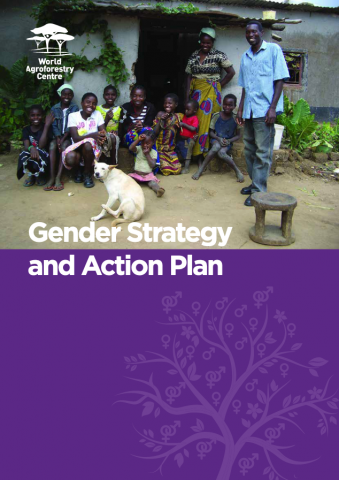World Agroforestry: Gender strategy and action plan
Abstract
Agroforestry is increasingly recognized as having a central role in sustainable agriculture. Research has shown that trees can deliver multiple benefits in agriculture – from combating climate change and contributing to food production and household nutrition, to providing sustainable fuel and timber (Mbow et al, 2014; Righe et al, 2014). Women farmers – who are often responsible for managing trees, especially at the early stages of establishment – are key players in agroforestry systems (Kiptot, et al, 2014). Yet women’s roles in tree-based agricultural production and the complex gender relations that shape decision- making have received minimal research attention. The World Development Report, published by the World Bank in 2012, states that gender equality is a core development objective in its own right. Increased focus on gender equality in production systems can transform agricultural livelihoods, improve development outcomes and make institutional cultures more enabling. This strategy and action plan approaches gender as a crosscutting element in agroforestry research and development and as a strategic research focus. It is aligned and contributes to the CGIAR strategies for integration of gender in research, at the consortium level and at the level of the different Consortium Research Programmes (CRPs) in which ICRAF participates. Integrating gender in ICRAF’s research will pave the way for scientists to improve their understanding of gender and facilitate the development of critical capacities to generate more and better quality research on gender and equity. This strategy and action plan systematically articulates key mechanisms and processes required to improve gender in agroforestry research and development. It also lays out a roadmap and action points to accomplish the objectives of the strategy. Objectives of the gender strategy: • Raise awareness and understanding of the importance of gender integration in agroforestry research and development in ICRAF and among partners through relevant gender sensitization and training; • Enhance gender research capacity in ICRAF and among partners through provision of expertise and robust tools; • Mobilize adequate resources to support the goals of this strategy and drive ICRAF’s vision of rural transformation in the developing world as smallholders increase their use of trees in agricultural landscapes to improve food security, incomes, health and environmental sustainability; • Generate a co-learning cycle between gender research and development practice and ensure that gender dimensions are fully integrated in negotiation support for relevant agroforestry landscapes.

